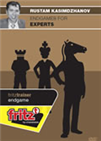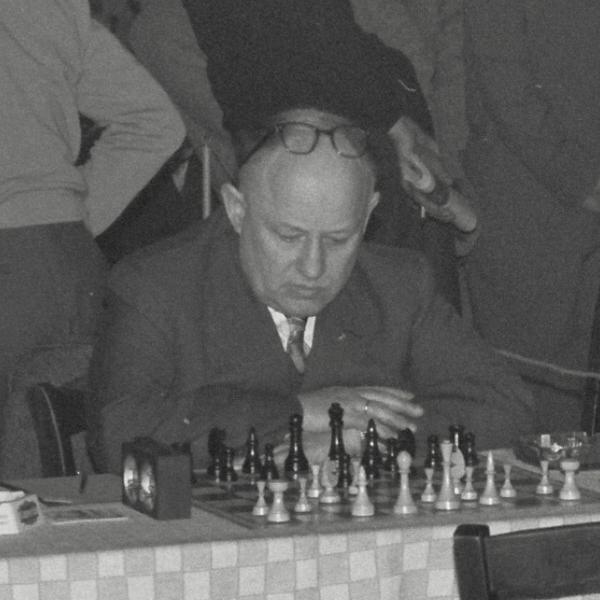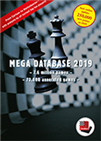Study of the Month: November 2018
As a strong player — a kind of local hero in Vienna — Heuäcker lived an active life as player, filled with numerous tournaments and other competitions are a testimony. German Wikipedia assumes that Heuäcker was less known as a player, but in my opinion, this can only hold true if it is compared to his internationally renowned endgame studies, not to his playing career itself. Of course, the soul of an artist had its price. Heuäcker valued beautiful, aesthetic chess more than practical necessities, tactics over strategy, at least according to the abovementioned online encyclopedia which is at first the source for the following biography.
We have talked about Henri Rinck earlier. Heuäcker won Rinck's book 150 Endspielstudien for his triumph at the 1922 tournament in the club tourney of the Friedenauer Schachgesellschaft (literally the "Friedenau chess community", but the word for "community" in German is also used for a company or club, as in this case).
Having grown up in Breslau (Polish: Wroclaw), Heuäcker, a year later, coincidentally moved to Vienna. There he met the Viennese masters Josef Halumbirek, Hans Müller, Georg Becker and Alois Wotawa as well as the great satirist Josef Krejcik. Of course, this was also the golden era of the Wiener Schachzeitung, the Viennese chess newspaper. Chess life in Vienna was rich and throbbing with dedicated chess cafés, many great players to be found, a golden era for chess in what soon would turn into one of the darkest eras of the century.
The worries were far away in 1927 when Ernst Grünfeld drew a match against Heuäcker. They arose in 1933 when he became a professional simultaneous exhibition player in Germany. In 1934 he played Susanna/Sonja Graf, beating the future Women World Championship contestant with 6:0. The first signs of trouble came, but Heuäcker managed to live from giving simuls until 1940, after the outbreak of the Second World War, when he became a tax office employee in Breslau, winning the city’s tournament from 1940 to 1942 three times.
And then the inevitable happened: Heuäcker, already in his 40s, was recruited as a soldier in Italy. Unlike many other composers — and dozens of million other people — Heuäcker survived and first moved to Goßmannsberg near Forchheim when the war was over.
In 1949, Heuäcker moved to Bad Homburg (“Bad”, meaning “bath”, is a German prefix for towns with health spas) where he resided for the rest of his life. Of course, while in Bavaria, he participated in 1949 in the Bavarian Chess Congress Masters, coming just 14th place from 56 particiants but receiving the title of Bavarian Master 1949 (presumably the 13 players in front of him were not Bavarians). His career as a regional top player ended with Frankfurt am Main Championship wins in 1951 and 1952.
The German chess problem federation Schwalbe has kindly provide me with an article by Jürgen Fleck about Heuäcker and Isenegger (issue 180). Some details here contradict the Geman Wikipedia article: Heuäcker moved to Vienna in 1927, not 1923. His professional simultaneous career lasted from 1933 to 1939 (not 1940). Most importantly, however, the additional information is provided that Heuäcker wrote poems and sometimes sang in front of an audience in addition to being a conférencier, i.e. a master of ceremonies in the European cabaret — essentially a humorist talking in front of an audience.
 If you want to play successful chess you must pay great attention to the endgame. On this DVD, Rustam Kasimdzhanov analyses the type of practical endgames which tournament players encounter on a daily basis. He explains what has to be known in order to make the correct strategic decisions and to find the correct plan in such endings. Kasimdzhanov’s outstanding and easily understandable explanations will certainly help you to substantially improve your own performance in the endgame.
If you want to play successful chess you must pay great attention to the endgame. On this DVD, Rustam Kasimdzhanov analyses the type of practical endgames which tournament players encounter on a daily basis. He explains what has to be known in order to make the correct strategic decisions and to find the correct plan in such endings. Kasimdzhanov’s outstanding and easily understandable explanations will certainly help you to substantially improve your own performance in the endgame.Although private photography was rarer while Heuäcker lived, possibly, in some archive, photos of Heuäcker as a comedian, as it is called nowadays, might still exist. If readers have any of those, they are asked to send them to ChessBase with the subject “Study of the Month: Paul Heuäcker” or similar, if they agree to a publication (please make sure you have the legal rights or they are in the public domain).

Heuäcker in 1960 | Photo: GFHund CC BY 3.0 via Wikimedia Commons
Heuäcker wrote the studies column of the "Schweizerische Schachzeitung" for 15 and “National-Zeitung” in Basel for 17 years. Speaking of people whom he looked up to for composing, in a letter to Filip Bondarenko, he named classical composers such as Hermanis Matisonis. This led him to follow his inspiration in compositions. Beginning in 1922, after winning Rinck’s book, Heuäcker composed a total of over 100 studies himself, collected in Georg Braunberger’s 1989 book “Phantasie im Endspiel: Paul Heuäckers Schachstudien” (published by Arno Nickel, who nowadays is better known as a correspondence chess Grandmaster and expert). There is a plethora of themes, including romantic ones. Many studies are of a tactical nature, others have a riddle-like character. For this reason, it’s impossible to name a certain style Heuäcker had, instead he composed in many styles. As such, the selection given this month can’t be representative of Heuäcker, but only offer a few colours of the kaleidoscope of his studies.
Apart from this, Heuäcker composed also a number of orthodox chess problems, and I found even a small selfmate idea in the Schwalbe Problem Database.
 The "Mega" is the database every serious chessplayer needs. The database contains 7.6 million games from 1500 to 2018, in highest quality standard, full of top level analyses and completely classified.
The "Mega" is the database every serious chessplayer needs. The database contains 7.6 million games from 1500 to 2018, in highest quality standard, full of top level analyses and completely classified.You probably know that you can move pieces on our replay boards to analyse and even start an engine to help you. You can maximize the replayer, auto-play, flip the board and even change the piece style in the bar below the board.
At the bottom of the notation window on the right there are buttons for editing (delete, promote, cut lines, unannotate, undo, redo) save, play out the position against Fritz and even embed the ChessBase game viewer on your website or blog. Hovering the mouse over any button will show you its function.

World Federation for Chess Composition (www.wfcc.ch)
Links

























